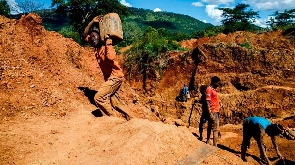The rush by exploration companies searching for oil and gas deposits in northern Zimbabwe has raised concerns over possible neglect of the environment, with activists fearing that lack of accountability will spawn a resource curse.
Invictus Energy, a firm listed on the Australia Securities Exchange, announced last week that samples from its first test well near the Mozambican border with Zimbabwe had confirmed the presence of light oil, gas condensate and helium.
It started drilling one of two exploration wells for oil and gas in September 2022 and it was described as the largest oil and gas exploration prospect to be drilled last year, at 845 million barrels of conventional gas and 4.3 billion barrels of oil.
A day after the Invictus announcement on Monday last week, it emerged that an obscure company had applied to explore for oil and gas at a national park, a designated UNESCO World Heritage Site.
Shalom Mining wants to hunt for oil at the Mana Pools National Park on the southern bank of the Zambezi River that serves as the border between Zimbabwe and Zambia. The area is close to the Invictus Energy Cobora Bassa project.
Although the exploration of oil and gas is still at an early stage, observers say Zimbabwe’s lack of strong instruments to enforce accountability in the extractives sector will make it difficult for the country to benefit from the resource.
A year ago, the government banned mining in national parks after two Chinese companies tried to open coal mines at the country’s biggest game reserve, the Hwange National Park.
Ambitious goal
Zimbabwe has an ambitious goal to increase mining revenue from around $2 billion to $12 billion by the end of this year.
“The purpose of making Mana Pools a World Heritage site is to protect and prohibit the commercial, exploitative, oil-seeking conduct that is being proposed,” said Fadzai Mahere, spokesperson of Zimbabwe’s main opposition party, the Citizens Coalition for Change.
“Section 73 of the constitution requires the State to preserve the natural environment and ban such activity," Advocate Mahere added.
Gift Mugano, a professor of economics, said it was too early to celebrate the prospects of oil and gas discovery in Zimbabwe because of accountability challenges.
“This is good news, but the worry is with our approach to accountability when it comes to natural resources,” Prof Mugano said.
“To be honest, we should not be holding our breath over oil and gas as if that is the only thing, which we have in this country. We have 60 minerals that are being plundered every day. There is chaos in the lithium and gold industry. There is chaos in precious metals like diamonds. It’s not more about the availability of gas and oil, but it is more about what we are going to do in terms of governance and accountability in our mining industry,” he added.
Strengthening systems needed
The Zimbabwe Coalition on Debt and Development (ZIMCODD) said the rush for oil and gas raised the need for the country to strengthen its systems to fight illicit financial flows and corruption in the extractives sector.
“Enabling corruption and illicit flows in the extractives sector include among others rising informality (artisanal mining), resource-backed loans (RBLs), archaic mining legislation, weak accountability institutions, porous borders and ports of entry, antiquated technologies, the opacity of granting of mining licenses, contract negotiations, allocation, and accounting of mining revenues, and political interference in mining decision making such as exploration, production, and marketing,” ZIMCODD said.
“Therefore, Zimbabwe must adopt or devise its local version of the extractive industries transparency initiative (EITI) standards.
“The bedrock of EITI is the belief that public resources belong to the citizens, hence the need to promote accountability, good governance, and participation of all stakeholders in the mining value chain.
As such, the EITI standards bridge the existing transparency gap by making mandatory disclosure of information such as contract awards and licenses, beneficial owners, payments to and revenues received by the government, revenue appropriation by the government, and the actual benefits to the citizenry.
More so, authorities must expedite the Mines and Minerals Amendment Bill to pluck existing loopholes facilitating illicit transactions and undermining development in mining communities.
In March, a documentary by Al Jazeera revealed that syndicates with connections to the country’s leadership were smuggling gold worth billions of dollars out of Zimbabwe every year.
Last month, The Sentry which describes itself as an investigative and policy organisation that seeks to disable multinational predatory networks that benefit from violent conflict, repression and kleptocracy, claimed that it obtained documents showing that President Emmerson Mnangagwa and his deputy Constantino Chiwenga received millions of dollars in secret payments from a chrome miner in 2017.
During the Robert Mugabe era, there were claims that Zimbabwe lost a diamond revenue of $15 billion due to illicit financial flows.
Africa News of Wednesday, 24 May 2023
Source: theeastafrican.co.ke

















